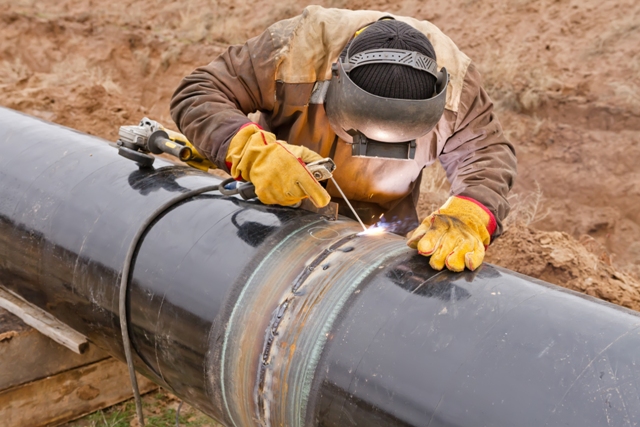
Four major unions back Energy East, cite job creation, ‘nation-building’
by Bruce Cheadle, The Canadian Press

TransCanada's 4,600-kilometre pipeline picks up major endorsement as company works to push mutlibillion-dollar project forward

Four major trade unions have thrown their support behind the project, saying it is a “nation-building” exercise
OTTAWA—Four major trade unions have joined forces with TransCanada Corp. to push the proposed Energy East oil pipeline as a “nation-building” exercise.
The alliance, symbolized by a memorandum of understanding signed July 14, gives the 4,600-kilometre pipeline from Alberta to New Brunswick a rare public relations boost after many months of public protests and highly publicized rejections.
“What we know is that there’s a silent majority of folks that understand the need for energy and understand the need to supply it responsibly,” TransCanada CEO Russ Girling said at a trade union training facility in suburban Ottawa.
“A portion of those folks are here today.”
Union and company representatives say construction and conversion of the oil line—two-thirds of which already exists as a gas pipeline—will support 14,000 jobs annually for almost a decade, although Girling said he expects the pipeline to be operational by late 2019 or early 2020.
The National Energy Board is about to begin a two-year environmental assessment of the $15.7-billion proposal, after which the Liberal cabinet in Ottawa will decide its fate.
The Conference Board of Canada issued a report estimating the 14,000 direct and spin-off job numbers from Energy East, but environmental groups dispute the long-term employment impact.
The advocacy group Environmental Defence issued a press release Thursday saying TransCanada’s own projections suggest only 132 permanent, direct jobs from the pipeline in New Brunswick, 114 in Ontario and 33 in Quebec.
For tradespeople in the pipeline building industry, that’s an argument for another day.
Joe Mancinelli, the international vice-president for the Labourers International Union of North America, which hosted the news conference, gave a full-throated endorsement of the pipeline, citing arguments that ranged from skilled trades training and job creation to safety, avoiding another Lac Megantic-like deadly train derailment and displacing imports of foreign oil.
“We are not going to eliminate these fossil fuels from coming out of the ground,” said Mancinelli.
An internal Finance Department analysis in December suggested that low global oil prices mean Canada won’t need any additional pipeline capacity “until at least 2025” but the sentiment at the union shop Thursday was that oil is going to be transported and it better be by pipeline rather than rail.
Forecasts for oil sands developments that are already underway suggest production will rise by about 300,000 to 500,000 barrels per day by 2020, said Girling.
“If we don’t build a pipeline, it will get moved by rail.”
Girling said Energy East has 20-year contracts with producers and refiners who “see the need for that (oil) five years out and 25 years out and are willing to sign those long-term agreements.”
Several speakers at Thursday’s news conference stressed the pipeline as a means to get Canada off foreign imports, although Irving Oil has already said it expects to continue importing Saudi oil to its New Brunswick refineries, and much of the Canadian crude is expected to be exported by ship to heavy oil markets abroad.
“We’re not going to dictate to our shippers where the oil goes,” Girling told reporters when asked about displacing foreign oil.
Economics will determine how Energy East’s product is used, said the TransCanada CEO, while wryly noting that “traders try to find a nickel of arbitrage between moving barrels around the globe.”
The message, he said, is “build it and we’ll see what happens.”
The irony that major trade unions—a movement vilified by the former Harper government—are now advocating for major resource infrastructure that was a top priority of the federal Conservatives is not lost on Mancinelli.
In an interview, the union boss laughed off the political paradox.
“Let me put it this way: it’s vital also to the NDP government in Alberta,” Mancinelli said of the pipeline.
“It all depends on what you’re after. What we’re after is continued jobs for our members, so it’s really not a matter of who’s in power or who we support politically. It’s more to do with the jobs.”
The pipeline unions involved are the Labourers International Union of North America, the International Union of Operating Engineers, Teamsters Canada and the United Association of Journeymen and Apprentices of the Plumbing and Pipefitting Industry of the United States and Canada.